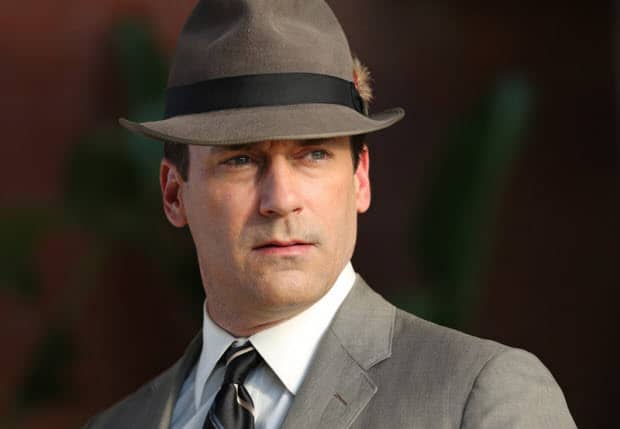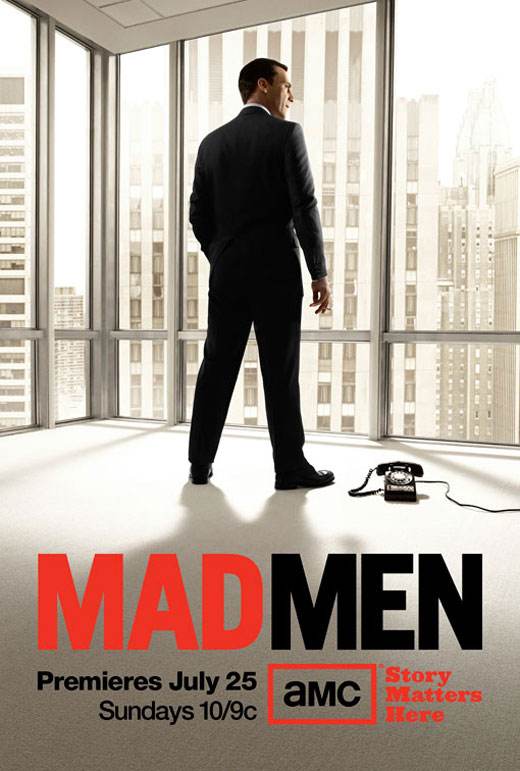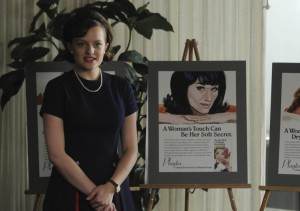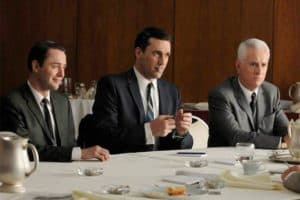
by Hunter Bishop
AMC has had quite a run over the past decade or so. They went from an obscure movie channel that was principally known for its showing of older films to one of the most envied producers of content on the planet, and it’s because of their work in the creation and production of two the greatest and most complete shows of televisions “Golden Age” in Breaking Bad and Mad Men.
Breaking Bad ended last fall, and it left a void that has been nigh impossible to fill. “True Detective” did admirable work, but as good as that show was that it learned all the wrong lessons in what made a great “Golden Age” show; not brooding male protagonists or dark plots just for the sake of dark plots, but instead strong and meaningful character and plot work that holds a candle up to society and illuminates what we otherwise did not want to see. So, while it was good and fun and even slightly profound TV, it still lacked the power, or the punch, of an all-time classic.
Mad Men is back, ladies and gentlemen. It’s back to fill that void, or so we hope. I am of the opinion that is the only show currently on television that can fill that void, and so my expectations on this season are sky high. I’ve resisted rewatching season six as the premiere approached, because I wanted to see if the show, devoid of the context of binge-watching, truly held up as I remembered it. To that, I have good news.
Mad Men is back, flaws and all. Let’s dive right in.
The seventh season premiere of Mad Men opens with Freddie Rumson pitching something called Accutron Watches. He is staring right into the camera, as if speaking to the viewer. Freddie wants us to pay attention, because something is happening here. He looks us right in the eye and tells us a story about a young man who, though his hair is long and shaggy he is a “businessman”, with serious intentions. He is the best of both worlds, with a watch that is not a “time piece” but a “conversation piece.” The camera pans out to reveal Peggy, who is visibly shocked, as I am sure every audience member was. Freddie Rumsen, with a “home run”, as Peggy calls it? Where did this come from? Is this the start of a new and interesting subplot as Freddie tries to reclaim his job?
Nope. Just Don, from the shadows, writing copy for Freddie to peddle. Of course, we don’t find that out till later, so we spend much of the episode thinking that the man who pissed his pants in season one all of the sudden dropped ad-bombs all over Peggy’s carpet all on his own.
[There’s a lot of evidence to suggest that Matthew Weiner believes Don to be the true hero of this story. Interviews that I’ve seen and read in the past make it out to be that Don is the one who is right and everyone else around him are the ones getting it wrong. I’m not gonna put words in Weiner’s mouth (DON’T), but, hypothetically, if this were the case, then that presents a serious problem for me, because Don isn’t the hero here, or ever, really. This potential subplot was All About Don, and I don’t think Don Draper has earned the right for this much of this universe to revolve around him. Yeah, he’s the nominal protagonist, but he’s also a serial philanderer and a borderline sociopath.]
The best thing about this whole opening scene with Freddie is that Peggy, after hearing this incredible career-making pitch, just straight up murks him. She changes it to something more elegant, more fitting, and just dismiss the rest of Freddie’s idea, which is a dismissal of Don’s idea, which mirrors the way she was treated by him and others early on her career. That kind of role reversal was really clever; even though I have a little bit of an issue about making it All About Don, I still think that in this case it’s a really interesting bit of subconscious domineering.
Don, as it turns out, is visiting in California. He’s been off the job for two months, not working at all, but still getting paid like a partner. He’s visiting his wife, in his ever-noble quest to be “bi-coastal”, and visiting Tinseltown. He even sees Pete, who is wearing a sweater around his neck like a predatory tennis pro and running SC&P East. He also has a really, really, REALLY hot real estate agent, and nearly scoffs at Don when he shows interest in her flirting. It’s a different world in that there California; it actually turned Pete into a spined, tanned, and confident individual. Truly the City of Angels. Ba dum tiss.
Megan has a part on a new sitcom, and a house overlooking the city. Don think’s its too far out away from people, like “Dracula’s Castle”, but Megan dismisses the idea. It’s pretty easy to tell by this point in their interactions that she’s not all that interested in him. She turns him down for sex twice, and when she finally gives in it’s more like a mother buying her kid the ice cream he wanted than actual, mutual enjoyment. The intimacy they had, though, the laying in bed and cuddling side, still seems to be there. That wont last forever, though, especially with someone like Don, and lo and behold, the minute he is on the plane, he starts chatting up a really hot stranger.
NEVE CAMPBELL SIGHTING. She sits beside Don on the plane ride home and there is an immediate (and puzzling) spark. Personally I think this happened all too fast with Campbell’s character. They connect on such a deep level that it begs the question on how much damage this girl actually has. She knew Don for like a second and just told him a story about how her fiance was dead and she had to sneak around Disney security to dump his ashes on Tom Sawyer’s Island. Don nearly kisses her after that, and they sleep close together on the plane. Later on he tells her that his wife knows he’s a bad husband, and that he really thought he could do this time and be better, but he can’t. At least he’s honest, right?
Soon after, though, he rejects her too, in favor of work, and we find out that he’s been feeding Freddie Rumson pitches. When Freddie comes over to the Draper apartment, it’s a dark and dank place; the patio doors are open and cold air is coming in but the doors are stuck, and they can’t be closed. Don, at the end of the episode, tries to close them again, but they wont. Don decides to just go outside and sit in the cold. Now, what this said to me was that his door of life was closing but not shut, that he was halfway in and halfway and that his only options were being totally out in the cold or being marginally warmed by the life he’s got left. This was a part that I really liked upon reflection, and I think it could really set the tone for the last season.
Premiere episodes are usually mostly concerned with checking in with the whole cast of characters, and Mad Men is especially good at this. Roger, we come to find, is sharing his bed with about eleventy-billion people, both male and female, and “smells of incense”. His hedonism has taken what you would call a sharp turn, accelerating from worrisome to straight up debauchery. Whatever hole he is trying to fill, it’s either too big or not being filled with the relationships that he’s having. We open on Roger lying on the floor amidst food and bottle and naked persons, watching as he wakes and takes a phone call from his daughter. She wants to have brunch on Sunday, and Roger, true to form, suggests a place that serves vodka.
This is an interesting subplot with an even more interesting payoff. When they do meet for brunch, she’s changed; she’s had a “come to Jesus” moment (or whatever the religion she believes in’s equivalent), and tells him that she forgives him, over and over and over again. John Slattery plays this to perfection; he is at his most glib, telling her over and over and over again that he forgives her too. It’s so brilliant because you can see the forced charm just oozing from Roger’s pores. There’s nothing genuine there, because he’s scared. He has no idea what the hell is going on with his daughter, and after the brunch he stays out all day and drinks. Roger, as you can tell, is not in the best of places. How much lower, though, can Roger sink? He doesn’t have much else to lose but his life.
Joan meets with Ken Cosgrove, who feels that he is over-worked; he demands some underlings, because underlings are what make you important. During this exchange, he berates Joan, treating her like a secretary, and orders her around in what can only be described as an incredible rude fashion. Joan is a partner, while Ken is head of accounts; she outranks him, yet she is treated poorly. Now, Ken is under a lot of stress; he is still wearing an eye-patch from the crash, so it’s understandable that he’s a little frustrated dealing with that and all of his other work. But the fact that he feels like he can treat Joan like that, like a servant, just underscores the sexism that pervades this era of American history. Joan is a high-ranking executive and partner at a burgeoning ad agency and she is screamed at with no fear of repercussions, and from one of the “good” guys, no less.
Because of Ken’s burden, Joan agrees to take on a meeting at a restaurant for him. The person Ken was supposed to meet was a marketing executive for Butler Footware; he’s young, chubby, and very WASP-y. He has an MBA, and wants to make a “bold move”. Butler Footware has it’s own advertising group in-house, and he thinks they should just cut ties with Sterling Cooper & Partners (SC&P) and do all their work just “down the hallway.” It’s easy to see the disdain this guy has for Joan. He thinks she’s a secretary or a messenger or something equally insulting and decides basically on the spot to fire SC&P. Joan convinces him to hold off on the decision, to which the guy does, but reneges; he schedules a meeting with SC&P to fire them. Joan tries to find Ken, but he’s on an airplane and not back to the office yet. Joan, who earlier had gone to a business professor and got information about the business world in exchange for small bits of information about SC&P (keep an eye on this), is forced to deal with it by herself, and she does. In the space of a thirty-second phone call and some really basic business information, Joan convinces him to back off.
Now, great for Joan; I have no doubt in my mind that she’s a genius and not given enough credit. But, really? One phone call and a single basic observation about markets and competition is all it took? The dude was hella gung-ho before! Is he afraid of phone calls? Was it long distance and his minutes were up? Did someone have a gun to his head, forcing him to fold faster than a house of cards underneath a ceiling fan?! It was a really quick and neat bow for the Joan subplot and I thought it sucked. They wasted a really good build-up. Thousand dollar build-up, penny-ante ending. It was so good up to that point, man!
Peggy, who in my opinion is really the hero/protag of this story, is feeling a mite underappreciated. Her new boss, Creative Director Lou Avery, is totally uninterested in anything she has to say. She works off the premise that Lou will be like Don; good arguments will sway him no matter what he feels. Lou is more old-school than that. She had brought him two ideas, one of which she didn’t like, and he asked her why she brought in an idea she didn’t like. Now, this is where Lou and Don separate: Don would’ve asked the same thing, but when Peggy gave her bastardized Freddie-pitch, he would’ve at-least considered it. Lou simply shoots it down, telling her that he doesn’t care what she thinks, and sends her and the art team out of his office. Peggy also has to deal with the return of her boss and former lover, Ted, who has just returned from California. The clear moved on-ness of Ted and Peggy’s obvious desire to be with him overshadows any professional relationship they might have. Since Abe is gone, she has no one, and after she snaps at Stan at the end of the episode over her frustrations with Lou Avery, she really has no one. Peggy is lonely, and frustrated, and overwhelmed just as much as Ken. When a tenant in her apartment building busts the toilet, she has her brother-in-law come over and take a look at it. He’s still at her apartment when she returns, asleep on the couch, but still decides to leave and go home this late at night because he “doesn’t want to leave Anita in the house.” Peggy breaks down after he leaves, crying on her knees, alone.
It’s an interesting bit of character work. Her behavior reminded me of Don’s; she pushed away Freddie once she had what she wanted, she snapped at the people trying to help her, and in her moment of vulnerability she turned to a member of the opposite sex to help make her feel better. None of this works for her, because Peggy isn’t two things: a man in the 1960’s, or a heartless bitch. She feels deeply, and cares even more, and she can’t reconcile being a great advertiser with being a horrible human being. She’s hit this beat before, been down this road before, but it seems to have sunk in more than ever. Maybe she’ll have learned this time.
Overall, I think this was a strong episode to start the season with. Some of the symbolism was a little too on the nose, but that’s Mad Men; can’t have roses without thorns or whatever. Hopefully the themes of the episode are explored more, because there is a lot of content to mine over the next seven or so episodes.
See you next week.
[Photo via Michael Yarish/AMC]
 Follow Us
Follow Us



